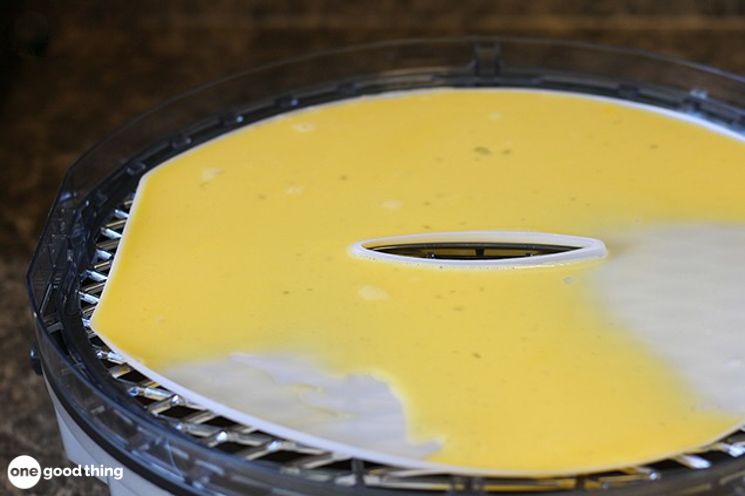
Knowing how to dehydrate eggs is a handy skill to have for just about anyone, but even more so for those with chicken coops at home. If you have more eggs than you can reasonably eat while they’re fresh, turning them into powdered eggs can extend their shelf life up to about one year while preserving their nutritional value.
Dehydrated eggs are also ideal foodstuffs for backpackers, hikers, and campers, because they’re lightweight and don’t need to be refrigerated. While it’s true that you can buy powdered eggs pretty readily, it’s always nice to know how to make egg powder at home and add another option to your food storage plan.
In this post, I’ll describe two methods you can use to dry and preserve eggs at home. Both options have pros and cons, but whichever you choose to use, you’ll need a food dehydrator. (Check Costco — I got mine there for around $40!) This is one small appliance you can get a lot of use out of, because there are a lot of dried foods that are useful to keep in your pantry!
How To Dehydrate Eggs In A Dehydrator
The first method I’ll walk you through involves dehydrating scrambled eggs, which is a relatively quick and worry-free process. It’s perfect for camping or backpacking, because you only need to rehydrate them in hot water and heat then through in a pan.
The second method uses raw fresh eggs, so it takes quite a bit longer than the first method. However, there is one major advantage to dehydrating raw whole eggs — they closely resemble the texture of a raw egg when reconstituted, so they’re excellent for recipes!

Method #1: Use Cooked Eggs To Make Powdered Eggs
Crack half a dozen fresh eggs into a bowl, whisk thoroughly, then cook the eggs in a nonstick pan without oil or butter. (Any added oil or fat will greatly reduce the shelf life of your dehydrated powdered eggs, causing them to go rancid much earlier than they would otherwise.)

When the cooked scrambled eggs are cool enough to handle, place the eggs onto your dehydrator trays, breaking up any large chunks for quicker drying. Set your food dehydrator to 150 degrees F (or medium heat), then let it run for about 4 hours or so. Check the eggs at regular intervals by squishing a piece between your fingers — if it doesn’t snap, it’s not dry enough!

When the eggs are dehydrated sufficiently, transfer them to a blender or food processor and grind the eggs into a clump-free powder. (If they seem gummy or aren’t grinding well, you probably need to dehydrate the eggs for a while longer.) For long-term storage, transfer your powdered eggs to an airtight container where they will keep for about a year.

These dehydrated eggs are a great way to have quick, high-protein breakfasts when camping or backpacking. To use them to make scrambled eggs, just add hot water, stir the eggs, and let them reconstitute for 5-7 minutes. Finally, heat them through (and this time you can use all the oil, butter, and add-ins you like!)

Method #2: Use Raw Eggs To Make Powdered Eggs
If you are drying eggs to use in baking, this is the best way to dehydrate them!
Whisk around half a dozen eggs, then slowly pour them onto a jelly roll sheet on one of your dehydrator racks. (Some jelly roll sheets will only hold around 5 eggs — if you want to dehydrate more eggs per batch, consider buying a few extra jelly roll sheets for your dehydrator — they’re great for making fruit leather!)

Set your dehydrator to 135 degrees F (or low heat) and let it run for about 12 hours. (It may take more or less time, depending on where you live — here in arid Utah, it takes about 10 hours.)
When thoroughly dried, put the dry eggs in a food processor or blender to grind them up into a powder. Again, if the dried eggs seem gummy, they’re probably not dry enough.
Note: Because this method uses raw eggs, it is important to use either pasteurized eggs, or high-quality eggs from a trusted source, like a local farm or your own backyard.

How To Use Dehydrated Eggs
To reconstitute previously cooked dehydrated eggs, combine one heaping tablespoon of egg powder with 2 tablespoons of hot water for each egg desired. Let the eggs rehydrate for about 7 minutes, then heat through on your stovetop.
To reconstitute raw dehydrated eggs, add 2 tablespoons of water to one heaping tablespoon of egg powder for each egg desired. Stir and let sit for 5 minutes — if using the eggs for baking, they’re ready to go! If you want to prepare them as scrambled eggs, use a blender or immersion blender and whip some air into them first — they’ll have a much nicer texture! To make them taste even better, add a fresh egg for every two or three tablespoons of dried eggs before cooking.
NOTE: Regardless of which method you used to dehydrate your eggs, the rehydrated eggs need to be cooked before you eat them. The temperature of your dehydrator isn’t high enough to kill salmonella, so be sure to fully cook them after rehydrating them so they’re safe to eat.
Have you ever tried dehydrating eggs?

 34 Comments
34 Comments



























